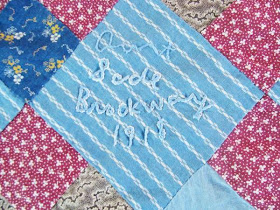One of the easiest clues to a quilt's date is this
claret red color for cotton prints, very popular from about 1890-1920.
There's some variety in the shade,
and you usually see it as a background behind a white figure.
It's not a clear red but a wine red.
The dyers and the catalogs called it claret after the
British term for red Bordeaux wine. I've also seen
it called Madeira, another kind of red wine.
At the turn of the 20th century quilters liked to mix wine reds and clear reds.
Something my mother warned me against.
Mixing reds was living on the edge to her generation,
born when these quilts were popular.
The dye was a new synthetic dye that was fairly reliable
although you can see a corner fading from light at the lower left.
Bleach could be hard on claret reds too.
Rocky Road to Kansas
Claret was very fashionable with quilters
who produced some great compositions
with the grays, blacks, indigo blues and reds
that were newly available at the time
They liked to mix them with shirting prints and plain whites.
This light gray shade of synthetic indigo called Cadet blue
was often mixed with the claret.
A very up-to-date look 100 years ago.
Like the rest of the quilts here
the general dates on the Mohawk Trail quilt above are 1890-1920.
The claret is such a good clue.
Pickle Dish
In an era of unstable dyes
claret red prints were inexpensive and reliable.
Chinese Coins,
a top sold at the American Quilt Study Group's
benefit auction a few years ago.
Deb Rowden owns this machine-appliqued quilt of
claret and other reds. You don't often see appliqued quilts
in the 1890-1920 period but the color and print
style is a good clue to that date.
Quilt dated 1918.
As the years went by the figures became simpler.
The color may be the same but the later multi-colored, mid-century prints
are very different in style.
Claret and white prints are a reliable clue to a date of 1890-1920.




D0BREHrEH-D!~~60_57.jpg)











sE9swm(yjsBR0KqrbyYw~~60_57.jpg)








I really notice the differences in red when I am working on a quilt and start pulling them out. I tend to go with darker reds and love them in my quilts.
ReplyDeleteDebbie
Beautiful. I smiled when you said your mother told you not to mix claret and clear reds. Something to rebel against.
ReplyDeleteAndrea, quilting in Minnesota